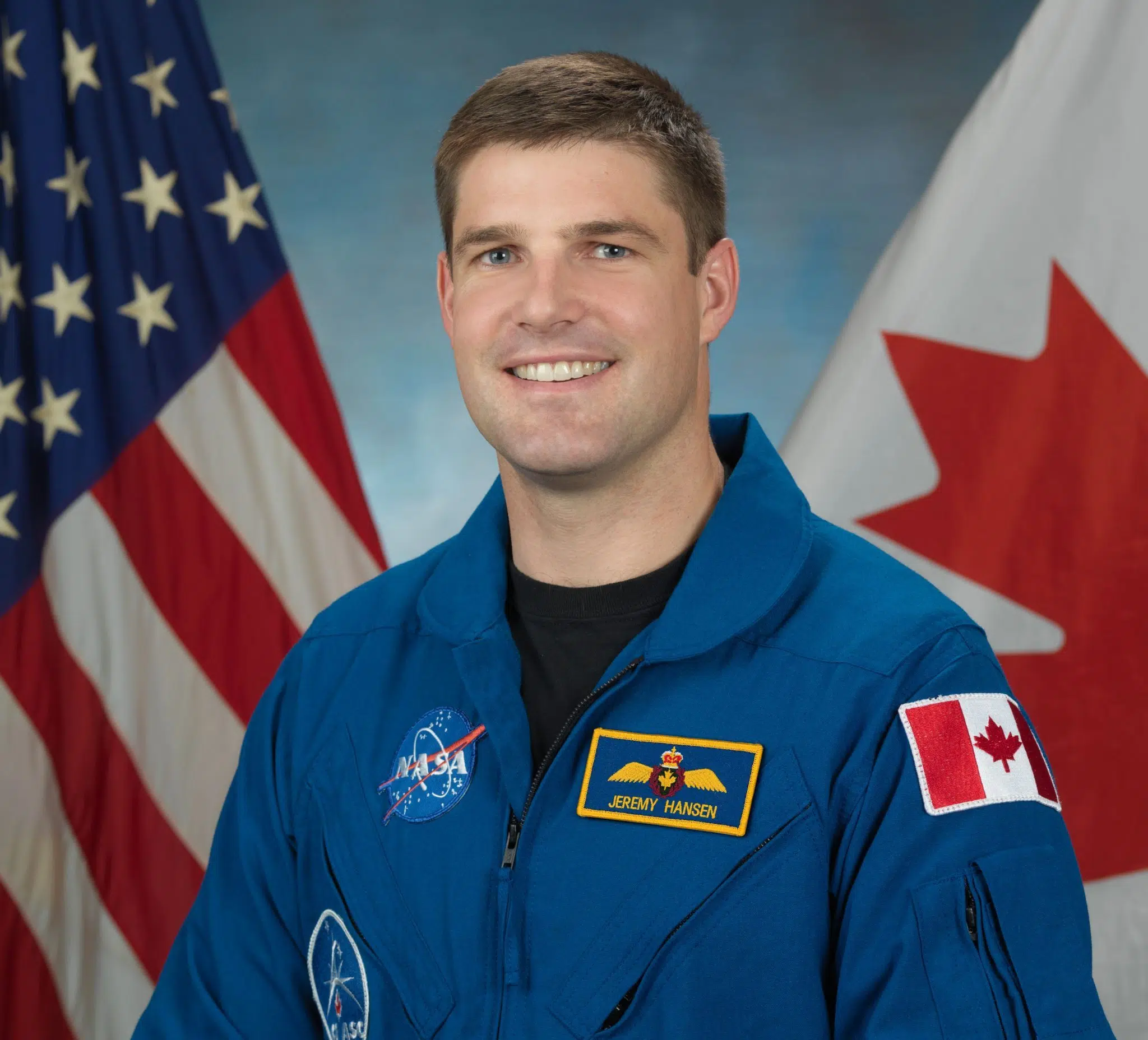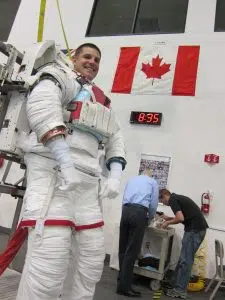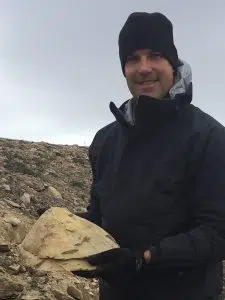
Photo Date: October 2, 2009 Location: Bldg. 8, Room 272 - Photo Studio Subject: Official Astronaut Portrait of Jeremy Hansen Photographer: Robert Markowitz
Astronaut, and the next Canadian in line to go into space, Jeremy Hansen will be speaking virtually with the Canadian Club of London on Oct. 22, 2020. Before then, XFM News caught up with the London native about some exciting new projects at the Canadian Space Agency and what he remembers about growing up in Southwestern Ontario.
Colonel Hansen grew up not far from London on a farm near Ailsa Craig, Ont., attending high school in Ingersoll.
“I have great memories of working on the farm, being outside, playing with my friends and my cousins in the barn,” said Hansen.
During his high school years, Hansen spent time with the 614 Air Cadet Squadron in London, Ont., and said he still feels lucky for the experience he gained there.
“I was so lucky to have that foundational training that they gave me,” he said. “Just some really great mentors in that program, I’m very grateful for that.”
The dream of space exploration struck Hansen at a young age, after he saw pictures of Neil Armstrong on the moon in early elementary school.
“I turned my treehouse into a spaceship, I had dials and controls, I was going on space missions all the time!” said Hansen.
The practice paid off, because in 2009, Colonel Hansen became one of two recruits selected by the Canadian Space Agency through the third Canadian Astronaut Recruitment Campaign. In 2011, Colonel Hansen graduated from Astronaut Candidate Training, which included scientific and technical briefings, intensive instruction in International Space Station (ISS) systems, Extravehicular Activities (EVAs, or spacewalks), robotics, physiological training, T-38 flight training, Russian language courses, and sea and wilderness survival training.
While Hansen awaits his mission assignment, he has been working to maintain his basic training, while also taking time to contribute to both the Canadian Space Agency and its international partners. He continues to practice flight training and simulated space walks, all the while helping develop new technology like the Canadarm3.
“It’s a big leap forward, we have a lot of demands,” said Hansen. “People probably think it’s simple, we’ll build another Canadarm2 and send it off to the moon, but it’s nothing like that. It’s a complete redesign.”
Colonel Hansen has also spent time as CapCom, the main point of communication between the International Space Station (ISS) and the ground. He said working in this role has been a major learning tool for what will someday be his own mission.
“It teaches you a lot, because you are right in the mix of operations,” said Hansen. “You’re listening to the entire team of experts, it’s just like the movies.”
“There’s no better way to learn than to be actually doing it,” he added.
Colonel Hansen also shared some advice for students who are dealing with life in self-isolation due to COVID-19. Hansen was a crew member for NEEMO 19, where he lived and worked on the ocean floor for seven days. In 2013, he also took part in a CAVES Expedition that involved spending a week four kilometers underground in a cave.
“Don’t underestimate how difficult it can be,” said Hansen. “Sometimes it may be really easy for you and other times it may not be easy. And I think it’s really important that people understand that that’s normal and that’s okay.”
He added that there’s nothing wrong with asking for help through these challenging times.
“Astronauts don’t go to space as individuals, they lean on a team,” said Hansen. “And sometimes they’re carrying the team and sometimes they’re being carried. That’s the truth about everybody on this planet.”
For him, finding gratitude in the good things in life is what helps get him through.
“You can always imagine how something could be better, even the greatest things you can often pick apart what’s wrong with it and how it could be better,” he said. “…but, staying in a place of gratitude to try and ground that, I think is really important.”
The future of Canadian space exploration
One issue that Colonel Hansen is focused on improving is healthcare, as the needs of astronauts and people on Earth align amidst COVID-19.
“As we send more and more people in space…we need more autonomy in our healthcare systems for astronauts,” he said. “And we have those same challenges here on the planet, in isolated parts of Canada. But also, for, even during COVID, for example, it’s just harder for people to get around or even access services.”
Colonel Hansen has already been working on ways to create solutions for healthcare using both perspectives from the space side and the terrestrial side.
“We don’t have all the answers, it’s never like that,” he said. “These are big problems that we need to just keep chipping away at.”
Another area he is working on is food security. Food is already being grown on the ISS mostly for testing purposes, but Hansen said the need to produce food in space is one possible solution to increasing food sustainability on Earth.
“This could be part of our food security solution set for isolated parts of Canada and places where it’s really hard to grow food or maybe, right now, impossible to find food.”
This has already been proven successful in Gjoa Haven, Nunavut, where community technicians have been growing vegetables in a hydroponic sea can station which simulates the conditions of space.
Lastly, Hansen said he believes the future of Canadian job creation could rely on satellite infrastructure. Space solutions, he said, can be exported and implemented around the world. The production of these niche technologies could be the key to “building Canada back,” according to Colonel Hansen.
Watch the full interview with Colonel Jeremy Hansen below:







Comments